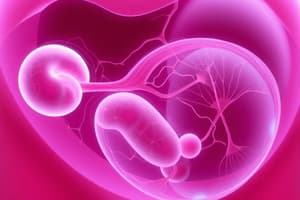Podcast
Questions and Answers
What are the key subtopics covered in human reproduction in this article?
What are the key subtopics covered in human reproduction in this article?
Male reproductive system, menstrual cycle, female reproductive system, fertilization, pregnancy, and puberty.
What are the components of the male reproductive system?
What are the components of the male reproductive system?
Testes, scrotum, epididymis, vas deferens, seminal vesicles, prostate gland, and penis.
What are the three phases of the menstrual cycle?
What are the three phases of the menstrual cycle?
Follicular, ovulation, and luteal.
What happens during the luteal phase of the menstrual cycle?
What happens during the luteal phase of the menstrual cycle?
What are the primary components of the female reproductive system?
What are the primary components of the female reproductive system?
What is the function of the fallopian tubes in the female reproductive system?
What is the function of the fallopian tubes in the female reproductive system?
Define fertilization.
Define fertilization.
What is the duration of a typical pregnancy?
What is the duration of a typical pregnancy?
What is puberty?
What is puberty?
What are the primary changes that occur during puberty in girls?
What are the primary changes that occur during puberty in girls?
Study Notes
Reproduction in Humans: Cambridge - Exploring the Subtopics
In this article, we'll delve into the fascinating realm of human reproduction, focusing on key subtopics: male reproductive system, menstrual cycle, female reproductive system, fertilization, pregnancy, and puberty. Although the provided search results don't pertain to these subjects, the information below has been compiled to provide a comprehensive education on human reproduction.
Male Reproductive System
The male reproductive system consists of the testes, scrotum, epididymis, vas deferens, seminal vesicles, prostate gland, and penis. The testes produce sperm, which fertilizes the egg during reproduction. The seminal vesicles and prostate gland contribute to the seminal fluid, while the vas deferens transports sperm and mixes it with seminal fluid. The penis allows for the delivery of sperm into the female reproductive tract.
Menstrual Cycle
The menstrual cycle is the monthly process experienced by women, wherein the uterus prepares for potential pregnancy. The cycle is divided into three phases: follicular, ovulation, and luteal. During the follicular phase, an egg-containing follicle matures. At ovulation, the egg is released from the follicle, and during the luteal phase, the corpus luteum produces progesterone, preparing the uterus for a potential pregnancy. If fertilization doesn't occur, the uterine lining sheds, resulting in menstruation.
Female Reproductive System
The female reproductive system consists of the uterus, ovaries, fallopian tubes, and vagina. The ovaries release eggs during ovulation, the fallopian tubes transport the eggs toward the uterus, and the uterus is where the fertilized egg implants and develops into a fetus. The vagina allows for the passage of sperm and the eventual delivery of the baby during childbirth.
Fertilization
Fertilization occurs when a sperm cell unites with an egg cell. This process can take place either naturally during the menstrual cycle or in a laboratory setting using In Vitro Fertilization (IVF). When fertilization takes place, the resulting zygote begins to divide, transforming into an early embryo.
Pregnancy
Pregnancy is the period during which a fetus develops and grows inside its mother's uterus. Pregnancy lasts about 40 weeks and is divided into three trimesters. During pregnancy, a woman's body undergoes significant changes, including hormonal shifts and physical growth to accommodate the growing fetus.
Puberty
Puberty is the stage of life when an individual's body undergoes significant physical changes due to the onset of hormonal activity. This transition from childhood to adulthood occurs around the age of 11-14, depending on the individual, and involves the development of secondary sexual characteristics, including the growth of body hair, breast development, and menstruation in girls.
In conclusion, reproduction is a complex biological process that involves a multitude of specialized systems and structures working together to ensure the continuation of life. Cambridge, as a renowned academic institution, is an excellent place to study and learn more about these fascinating subtopics in biology and human anatomy.
Studying That Suits You
Use AI to generate personalized quizzes and flashcards to suit your learning preferences.
Description
Explore the intricate subtopics of human reproduction including the male and female reproductive systems, fertilization, pregnancy, puberty, and the menstrual cycle. Dive into the details of these fascinating biological processes and structures with this comprehensive quiz.




